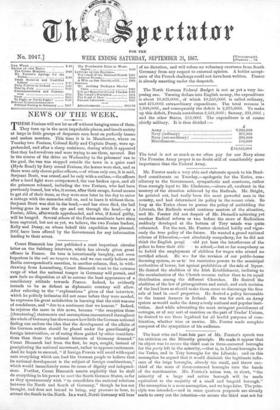Mr. Forster made a very able and elaborate speech to
his Brad- ford constituents on Tuesday,—apologetic for the Tories, con- ciliatory to the Government, sympathetic and courteous, rather than strongly loyal to Mr. Gladstone,—above all, exultant in the mastery of the situation achieved by the Radicals. Mr. Bright, he pointed out, had really been the most powerful man in the country, and bad determined its policy in the recent crisis. So long as the Tories chose to pursue the policy of outbidding the Liberals, the Radicals would continue masters of the situation, and Mr. Forster did not despair of Mr. Disraeli's achieving yet another Radical reform or two before the store of Radicalism suddenly developed at the bottom of Tory minds was quite exhausted. For the rest, Mr. Forster sketched boldly and vigor- ously the true policy of the future. He wanted a grand national scheme of Education,—not absolutely compulsory, for he did not think the English peopl. ,!uld yet bear the interference of the police to force their chit• to school,—but so far compulsory as to forbid the employment of children for wages who attend no certified school. He wrg, for the revision of our public-house licensing system, so as to ive restrictive powers to the municipal authorities of towns, but against prohibition of the Bale of liquor. He desired the abolition of the Irish Establishment, inclining to the secularization of the Church revenue rather than to its equal distribution among the different Churches. He desired the abolition of the law of primogeniture and entail, and such revision of the land laws as should make them cease to discourage the free sale of land in small properties. He desired a policy favourable to the tenant farmers in Ireland. He was for such an Army system as would make the Army a truly national and popular insti- tution. And while advocating the most stringent punishment of outrages, or of any sort of coercion on the part of Trades' Unions, he desired to see them legalized for all lawful purposes of com- bination, whether wise or unwise. Mr. Forster made complete conquest of the sympathies of his audience.






























